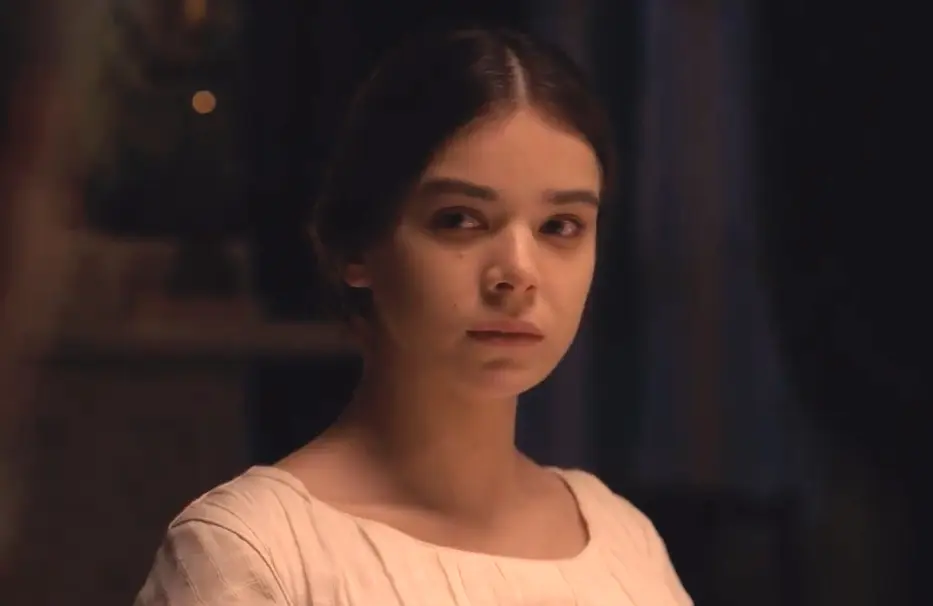Music is the Key that Unlocks Dickinson's Modernity
-
 Hailee Steinfeld stars in Dickinson. (Apple TV+)
Hailee Steinfeld stars in Dickinson. (Apple TV+)In reimagining the life and times of Emily Dickinson with a contemporary toolbox, Dickinson has been described as the wildest, weirdest and most earnest show on Apple TV+. And while it's certainly not for everyone (Primetimer's Aaron Barnhart wasn't a fan), for those with whom it has resonated, it follows in the witty youthful traditions of Kevin Williamson and Amy Heckerling.
Perhaps most impressive, the show manages to use the life of the iconic 19th-century poet to comment on the personal and political issues of our time. So how exactly does it pull off this unlikely hat trick? It slaps down a banging playlist of songs to shuttle the past straight into the now. Dickinson, of course, isn’t the first to use this device. But where other works of musical audacity have often stumbled (inducing eye-rolls and groans from audiences), Dickinson soars, managing to craft a playlist that matches the very precise point of view of this unique series.
With relatively little known about the real-life Emily Dickinson, her story has inspired many different interpretations, most of them derived from her her legacy as a feminist figure. For its part, Dickinson imagines her in the vein of an 18th century Tumblr girl, brooding privately in the escape of her fantasies while openly challenging the expectations and limitations placed upon young women at the time. She has a secret queer love, aches for her father's approval, and just wants to be free to produce her art. You know, the emotional stuff of modern introspective pop that thrives in the privacy of the internet.
Oh, and Wiz Khalifa plays the personified Death that Emily visits, shrouded in a sexy-gloomy mystique of Billie Eilish tracks. In terms of imaginative musical recontextualization, the show's vision makes glorious sense.
The brilliance of Dickinson's music supervision (aided by a seamless and intuitive original score by Drum & Lace and Ian Hultquist) isn't just that it provides a unique interpretation of the poet, but that it becomes its own emotional language to understand her circumstances through today's ears. Sometimes its songs communicate in shorthand just what was so radical about Emily Dickinson. Pairing something like A$AP Rocky or Noga Erez to period garb heightens the sense of rebellion opposite the patriarchal demands of polite society. Alternately, a Damien Rice song lends Emily's despair a relatability straight out of Shondaland's musical rulebook.
Music helps realize the series' thematic aims of using Emily Dickinson's time to understand our own (and vice versa), particularly in the show's queer bent. The show gets that Emily especially wouldn't have the vernacular to recognize her otherness with regard to her attraction and love for her brother's girlfriend Sue Gilbert (Ella Hunt). While Lizzo's "Boys" goes from a song about thirst to a subversion of gender roles when they delight in donning male drag, most of the queer sentiment on the soundtrack lives as a suggestion. In this suppressed emotionality, music projects everything Emily is feeling but can’t put words to, lending her a specific emotional truth for more modern gay audiences wondering why she can't simply be gay when the series already positions her as a self-assured outsider.
Euphoria comes from the thrill of breaking unspoken rules with gay sex in the most musically transformative moment of the season. If there was ever a song to get fingered to by a secret crush, it’s Mitski's "Your Best American Girl." It's a track that speaks to both knee-shaking lust and alienating outsiderism, but its rough-blossoming, anthemic verve feels like a feverish transgression. It's a perfect moment that gets us caught in the rush of young forbidden love, maybe one that's all the more heightened because it has an end point.
But Dickinson's most impressive musical feat is examining the privilege inherent to Dickinson's uppercrust circle, hilariously establishing it to song, before soberly unpacking it without. In episode three, "Wild Nights", Emily stages a house party while her parents are away and after the opium has been passed around, it devolves just as a debauched house full of intoxicated white kids might today: straight into Carnage's "I Like Tuh". In a dance spectacle that mashes together prim period choreography with the drunken caucasian krumping of your local frathouse, the show achieves its cross-era concept by making you understand the context of Emily's experiences through contemporary cues.
Then, in the fifth episode "I Am Afraid to Own a Body," the series does the thing you desperately hope it will do and unpacks this group mentality beyond farce. The group is again united for Shakespeare club, quickly coming apart when a recitation of Othello finds Emily forcing a black tradesman Henry (Chinaza Uche) to assume the title role. But arguments quickly emerge about the supposed indecency of such inclusion, inciting such strong opinions when they had previously only been participating half-enthusiastically. Not only are they guilty of indulging their privilege and outright exploiting Henry, but Emily is as well for her false good intentions that were ultimately only self-serving. The earlier vision of their mimicking black art in a posturing of hip-hop cool is hard to forget, playing out in this episode in ways that reverberate into our present and accentuate their hypocrisy.
Witty, bold and thematically resonant, Dickinson's musical modernity is the show’s masterstroke, revealing it as the richly textured and deeply thoughtful series that it is, leaving those of us under its thrall no choice but to slam the repeat button.
Chris Feil is a freelancer writer and co-host of the This Had Oscar Buzz podcast. His previous work can be found at Vulture, Vice, Paste, and The Film Experience. Follow him @chrisvfeil on Twitter.
TOPICS: Dickinson, Apple TV+, Hailee Steinfeld, Music and TV